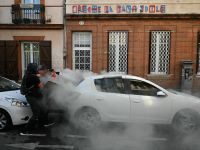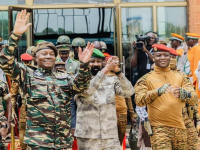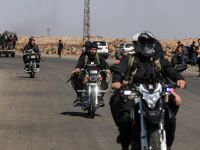Asian share markets plummeted from the first minute Wednesday, September 11, following the horrific attacks in the US, which struck at the very heart of the world's supreme economy. Huge falls were recorded in Tokyo, Singapore, Hong Kong, South Korea, Sydney and New Zealand wiping millions off regional share prices in one fell swoop.
Some anxious Asian stock exchanges took the decision to stay shut, hoping to wait out the shock waves striking the world's financial markets after suicide squads flying hijacked American planes reduced the World Trade Center in the financial district of New York to rubble on Tuesday.
Four planes were hijacked in the United States Tuesday, two of which crashed into the World Trade Center. Another struck the Pentagon in Washington and a fourth crashed near Pittsburgh, Pennsylvania, US authorities said.
The worst hit Asian market was Seoul, where the composite index plunged 11 percent or 60.15 points to 480.42 immediately after the market opened, prompting an obligatory 20-minute suspension of trading.
In Tokyo share prices fell below the psychologically important 10,000-point mark for the first time in 17 years as investors fled the equities market in the aftermath of the attacks, dealers said. "All the shares were sold down (in Tokyo) this morning. Only a few are being bought," said Nissan Securities equity chief Masaru Kazama. "If all the shares fall to the stop-loss level it is estimated that the Nikkei would lose 824 points and it's possible it could go down to that level," Kazama said.
Share prices in Tokyo fell 5.0 percent Wednesday morning to trade around 17-year lows, with the Nikkei-225 index down 519.24 points to 9,773.71. To avoid confusion related to the multiple terrorist onslaught, the Tokyo Stock Exchange (TSE) halved the day's daily limit on price movements of individual stocks and started at 9:30 am (0030 GMT) — half-an-hour later than usual.
"We urge investors to behave in a discreet manner and brokerage houses to operate in a discreet and appropriate way," said TSE President Masaaki Tsuchida in a statement. "Given the unstable situation in the market, we also urge them to refrain from taking any action that may undermine credibility in the market, such as spreading rumors," he said.
Economic damage of the terrorist attack was certain to be felt in Asia and across the rest of the world, said Finance Minister Masajuro Shiokawa. "This terrorist attack is terrible and intolerable. Each country should consider how to protect peace and prevent the recurrence of such a disaster," the minister told reporters at an impromptu briefing at the ministry. "The world's leading economies need to cooperate to overcome the effects of the tragedy," he said.
Share prices in Singapore plummeted in Wednesday trade as investors dumped shares, dealers said. The key Straits Times Index (STI) was down six percent or 94.13 points to 1,472.63 points at 9:25 am (0330 GMT). At the start of trading at 9:00 am, the STI dived 136.64 points to 1,430.12.
Hong Kong share prices plunged 7.6 percent to below the key 10,000 mark in opening trade with the Hang Seng losing 790.00 points to 9,627.36, dealers said. New Zealand share prices were also sharply lower at midday with the benchmark NZSE-40 Capital Index falling 83.87 points or 4.26 percent at 1,880.82 at midday.
Australian shares plunged almost four percent in one of the worst ever one-day falls on markets, brokers said. By midday, the key all ordinaries index had fallen 119.7 points to 3,063.5 while the SP/ASX200 shed 114.6 to 3127.4 points, echoing the declines in major markets around the world.
The Stock Exchange of Thailand (SET) decided to close for at least a day, in line with markets in Taiwan and Malaysia. "We decided to close the SET for one day as we considered the events would impact negatively on all markets," said SET president Kittirat Na Ranong.
Japan's Financial Service Agency (FSA) has set up a special crisis management headquarters and will address the emergency by keeping in close contact with the Bank of Japan and financial authorities of foreign countries.
Japanese Chief Cabinet Secretary Yasuo Fukuda also urged market participants to remain calm. "We hear that the Tokyo Stock Exchange is taking appropriate actions (to stabilize the market)," he told a press conference. "We urge market participants to be calm."
Foreign currency trading in Tokyo dwindled to a trickle in the wake of the attacks, dealers said. The dollar was quoted at 119.37 yen at 11:00 am (0200 GMT) against 119.21 yen in New York and 121.71-73 yen in Tokyo late Tuesday.
"Usually the foreign exchange room is like a fish market but today it is (quiet) like a holiday," said Nikko Trust and Banking deputy general manager of treasuries Yasuji Yamanaka. "After the New York terrorist crash dollar trade is very thin and almost no one is taking part in the market," he said.
Oil prices surged in early Asian trading on concerns of mounting tension in the Middle East after deadly terrorist attacks in New York and Washington, dealers said in Singapore. Brent crude oil for spot delivery was fetching between 30 US dollars and 31 dollars a barrel, compared to around 24 dollars before the attack, they said. ― (AFP, Tokyo)
by Hiroshi Hiyama
© Agence France Presse 2001
© 2001 Mena Report (www.menareport.com)







